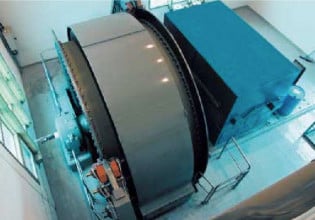Secure, Scalable, and Configurable Linux for Embedded Designs
Siemens PLM Software announced a new enterprise Mentor® Embedded Linux® (MEL) solution that provides electronics manufacturers secure, scalable and configurable distributions for industrial, medical, aerospace, and defense applications.
This new MEL technology is a configurable distribution that offers a robust operating system platform for embedded systems development. The technology is a result of the continued integration of the recently acquired embedded systems design capabilities from Mentor Graphics. The solution is based on Debian, a broadly utilized, enterprise-class, open-source Linux operating system.
Siemens says its new enterprise technology delivers the stability, full features, and ease-of-use benefits of an enterprise solution, and the performance, customizability, and footprint of an embedded operating system.
An internal team of embedded Linux experts originally developed this robust solution for use on critical Siemens automation equipment. Now commercially available, embedded developers can utilize this proven solution, thereby mitigating the costs and risks of moving to Linux.
"As more engineering organizations recognize the value of open source solutions, next-generation embedded systems are also redefining software development needs," said Chris Rommel, executive vice president of VDC Research. "Although many developers have gained experience with enterprise Linux, those traditional solutions cannot meet the performance requirements of most embedded systems. The new Mentor Embedded Linux addresses this issue, providing an enterprise-class solution for those developers looking for a Linux development experience beyond that for the platforms based on Yocto commonly used in the embedded market."
Pre-built and Fully-Tested Binary Packages
The large number of pre-built and fully-tested binary packages integrated into the Siemens enterprise MEL solution offer all of the general features and parameters in the software platform so a large number of users can install it and use it with ease. According to Siemens, these features can make standard implementation across organizations much easier and more efficient.
The Siemens binary MEL solution also includes a stable kernel and a robust toolchain. Both have broad community support. This community support, combined with the commercial support and development power of Siemens, allows increased development productivity and agility, according to the company.
"By combining the capabilities of an embedded Linux distribution with those from the Debian binary desktop Linux distribution, today's developers - many of whom have honed their skills in the Linux desktop development - can easily extend those same skills into fully featured embedded systems," said Simon George, director of system software and SoC Solution Marketing, Xilinx. "We expect that Mentor's binary Linux solution will simplify many tasks for those who are developing with advanced SoCs such as Xilinx Zynq UltraScale+ MPSoC devices."
Secure Field Updates
Available security patches and product updates enable embedded developers to stay up to date for enterprise-class standardization and maintenance.
The new Linux solution can support secure field updates, and application isolation. Customers can thereby realize the cost efficiencies of remotely maintaining and updating their devices.
This solution is also multicore-enabled to consolidate multiple heterogeneous runtime environments using today's most advanced processor architectures and the Mentor® Embedded Multicore Framework. A Multi-core capability helps embedded developers quickly build systems that integrate the Siemens binary Linux, and the Nucleus® real-time operating system (RTOS) on complex system-on-chip (SoC) processors.
"Siemens is excited about the operating system that our Mentor colleagues have designed for us. It's the first of its kind for the embedded market, providing the robustness and ease of use benefits of an enterprise operating system, with the footprint, security, real-time behavior, and development tools needed for embedded applications - a new compelling option for embedded developers," says Steffen Peschmann, SIMATIC IPC Product Manager. "At Siemens, we are currently working on some new products made possible only with this unique operating system. This flexible embedded operating system will open up completely new possibilities for us."
The solution supports the industry-standard cloud and IoT technologies such as XMPP, MQTT, AMQP, CoAP, and RESTful API.
Development and analysis tools come with the solution for configuration and optimization of the operating system (OS). So, customers can analyze the state and operation of the embedded platform.
The industry-proven Sourcery™ Analyzer technology can generate time-series data for OS/platform diagnostics and device profiling.
In addition, Siemens' embedded team of experts can provide support, training, and professional services, from basic support, updates, and upgrades to critical security defects patches, platform extensions, and customized training.
Product Details and Availability
The binary solution based on Debian supports multiple leading hardware architectures and will ship in Q2, and will be showcased at Embedded World 2019, February 25-28, 2019 in Nuremberg, Germany (Mentor booth, Hall 4, #4-643). A MEL version based on the Yocto® Project is also available.






